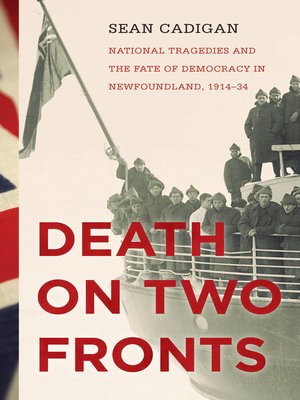Death on Two Fronts
ebook ∣ National Tragedies and the Fate of Democracy in NFLD 1914-1934 · History of Canada
By Sean Cadigan

Sign up to save your library
With an OverDrive account, you can save your favorite libraries for at-a-glance information about availability. Find out more about OverDrive accounts.
Find this title in Libby, the library reading app by OverDrive.



Search for a digital library with this title
Title found at these libraries:
| Library Name | Distance |
|---|---|
| Loading... |
Death on Two Fronts, part of The History of Canada series, examines the tragic transformation of Newfoundland’s political culture between 1914 and 1934. For many people throughout Canada and the rest of the world, 1914 was important because it marked the beginning of the First World War. While the year became significant for the same reason in Newfoundland, it was not originally so. Newfoundland’s economy depended on the sea, and the seal hunt was vital. During the spring of 1914, seventy-seven men of the S.S. Newfoundland died and many more were injured when they became lost on the ice fields, locally known as “the front,” off the northeast coast. What became known as the Newfoundlandsealing disaster galvanized popular discontent against mercantile profiteering and recklessness on the seal hunt, and influenced Newfoundland politics. The Great War muted this discontent and fostered a nationalist political culture founded on notions of honour, sacrifice, and patriotism—particularly after the mass deaths in the Royal Newfoundland Regiment at Beaumont Hamel. This nationalism was easily shaken, however, in the post-war economic crisis that plagued Newfoundland, frustrating more progressive attempts to deal with economic and social problems, and led to the collapse of responsible government in 1934. Although sealers had died in 1914 and soldiers fell in the years of the Great War, it was liberal democracy in Newfoundland that was the final casualty in the bitter struggles over the meaning of these events.







